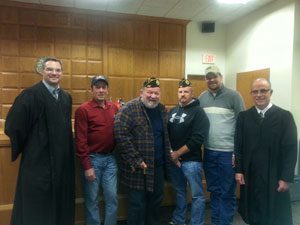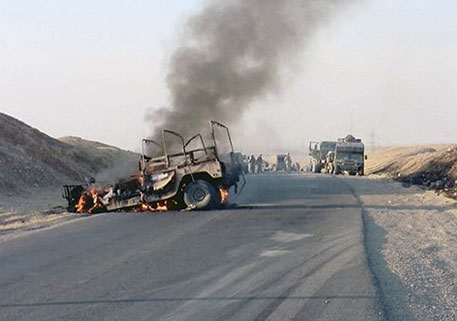
Judge Robert Russell established the first Veterans Treatment Court in 2008 to provide a court program tailored to the unique experiences and needs of veterans struggling with mental health or substance abuse issues from their service.
One of the most powerful components of the military is the strong esprit de corps and brotherhood of service. In an effort to better engage those going through the treatment program, Russell tapped into that sense of camaraderie by using veterans as mentors to the accused.
“The secret sauce is the men and women who volunteer to be mentors,” said Russell. “His or her motto is to leave no one behind. They are co-facilitators, advisors and sponsors for support.”
Members from DAV Chapter 17 in Oshkosh, Wisc., have been spending their time volunteering as veteran mentors in the Outagamie County Veterans Treatment Court since its inception in 2012.
“If you want to be a mentor the biggest thing is to be empathetic,” said Bill Trombley, DAV Chapter 17 member and the first veteran mentor at the Outagamie County Veterans Treatment Court. “Get involved, but get involved because you care and want to help.”
Veterans who enter into the court are assigned a veteran mentor to help inspire, motivate and support through the rigors of their treatment plan. Ultimately, the goal is to bring back the structure they had while serving their country – along with the pride that went with it.
“It ranks right up there with anything I have done,” said Todd Raley, DAV Chapter 17 member and Veterans Treatment Court mentor. “You never leave a fallen comrade behind. I just want to help them. It’s very, very important to me.”
The mentoring aspect of Veterans Treatment Court is unique in that it does not exist in other forms of treatment courts. There is no standard relationship between mentor and mentee but typically they communicate a few times a week and often mix in some social activities.
“Seeing the improvement in the participants is indescribable,” said DAV Chapter 17 member and mentor Adam Alexander. “Also, the program is incredibly effective. The recidivism rate of those who successfully complete the program is next to zero.”
When a veteran completes the program, the charges against them are often dropped or reduced significantly. But while effective, the Veterans Treatment Court is not a walk in the park.
“Veterans Treatment Court is not a get out of jail free card,” said Raley. “It’s actually a lot of work. It’s a 12-month program. It would be easier for them to take the 30 to 60 day punishment,” Raley said. “But, this speaks to their character that they take this program on.”
Raley, who served in the Army, sees some similarities between what he does as a mentor and one of his roles in the military.
“I was a drill sergeant in the Army and it was about seeing something through from start-to-finish,” Raley said. “Mentoring is the same type of experience. In the beginning you may have some problems, but if you do it right, you’ll see progress daily and eventually a graduation.”
Alexander, a Purple Heart recipient from the war in Afghanistan, stressed the importance of having a Veterans Treatment Court.
“Military service, especially in combat, is incredibly difficult on a person,” Alexander said. “When a veteran finds themselves in contact with the criminal justice system it’s important the system takes the toll war has had on them into account.”
Veterans Treatment Courts throughout the country are looking for more veteran mentors. If you or any veteran you know would be interested in volunteering as a mentor please visit http://www.justiceforvets.org/.






